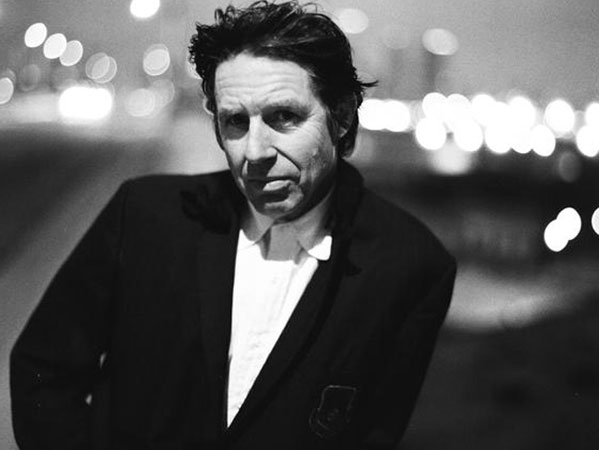I kinda wanted to talk about the music industry, and I wanted to get into it by talking about the character you played in Georgia, because I’ve never been in a band, but watching that it seemed like the most realistic portrait of a real working band that I’ve seen in a movie. Playing bowling alleys and bar mitzvahs, but still being able to make a living at it, which is kind of a triumph in itself. I wondered: is it really that authentic, and is that what drew you to the project?
John Doe: What drew me to the project was working with [director] Ulu Grosbard and Jennifer Jason Leigh and Mare Winningham, and it being a great script. But I think it is accurate, to a bar band. Luckily, that’s the only time I’ve played “Hava Nagila.” Guaranteed. And I hope it’s the only time that I play it; not that it’s a bad song, it’s …
[Laughing throughout] It’s of a situation you’re not often in …
Yes. It sort of has a certain … je nais se quoi. [Laughs] But … the only thing that I don’t think a movie has ever captured in the music world is the speak that musicians have, the way that people are constantly capping on each other, and the banter that goes back and forth at rehearsal and just as they’re hanging around. I think that would be really difficult to script; you’d have to record it and then transcribe it. Even in Spinal Tap, it didn’t have that. I think of that sometimes in rehearsals and stuff.
The sickest part about doing acting is that then you find those same situations coming up in your real life. And then you’re wondering what’s real and what’s not.
Flashing back …
It’s just weird. Right around that same time when we were promoting Georgia, I was doing a tour on my own, and there’s this one place in Cincinnati called Sudsy Malone’s, which is a Laundromat-bar-gig.
One-stop shopping.
And it’s very popular with a certain level of musicians, because then they know that there’s one place they’re going to have clean clothes. And you can put your laundry in between soundcheck and the show and have it pretty much done. I’m sure that someone has probably gotten offstage while they’re playing so they can put it in for the …
[Laughing throughout] Put the fabric sheet in the dryer …
Right. [Laughs] I don’t think they’re worried about fabric softener with their jeans and t-shirts.
Your character had a line in that movie, something like “Look Sadie, things are really happening for us, and I don’t want you to fuck us up.” And to most people, for this band, nothing’s really happening; they’re playing bowling alleys. But for that band, to be able to just make a living playing is probably a pretty big deal.
Right, right.
They don’t have to worry about the day job anymore.
I think a lot of people would be better if they did have a day job. And in a way, acting has provided that for me, to do it for the right reasons; to do it because I love it, and because I need to do it, for creativity and stuff. And you can get—when you have a major label contract, you can get distracted, or you can get too far away from the reason you’re doing it. Because it becomes a job. And I think I was there—I was there with that Geffen contract, and I was there with kind of losing the reasons to write songs, or writing songs just for X, and it kind of came back after doing that Rhino record [Kissingsohard, 1995]. I’d collected a bunch of songs to do that record and then toured that, and then, just through personal life and things that happened, I realized I’d lost a sense of discovery, and a sense of searching for something and trying different things. Doing that Kill Rock Stars record [For the Rest of Us (EP), 1998) was—I tried to be innovative and tried to do different things, and carried it over into this one. It’s important.
Do you feel that you’re still “paying your dues”? Is there a point in your career where you thought “OK, I’m here; this can now be my job, I don’t have to worry about where the next paycheck’s coming in”?
Everybody has to worry about where the next paycheck’s coming in. Because everyone extends themselves over and above what they actually make. [Laughs] Everybody does.
This being America, after all.
Yes. Not just because it’s America, because you develop a lifestyle. I’m still having character-building experiences, let’s put it this way. [Laughs] You know, once you accept the fact that life is struggle, then you can embrace it a little bit better. My priorities are not security and comfort, although it’s nice to have in moderate amounts.
Well, you do have a family to help keep up—
I do.
—and that’s always a consideration.
It’s a great source of love, it’s a great source of happiness, and also it can take you away from what you really need to be paying attention to, which is a difficult balance. My wife is finishing school, she’s been going to school for five years, and so I’ve been taking the kids to dance classes and Girl Scouts and crap like that, and sometimes I have to turn down auditions, and say “I can’t do that, because I’ve got to be home.” And that can be really frustrating. Because you’re not paying attention to what you’re supposed to be doing. But that’s part of the tradeoff. Continue reading
